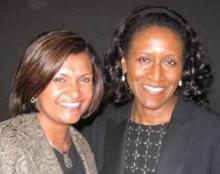SAN DIEGO – A plan to form "affinity groups" got off to a rousing start as participants in a women’s-interest session the enthusiastically signed up for a new listserv.
The affinity groups are designed to promote communication among members with common interests, said Dr. Janet M. Nagamine, a Society of Hospital Medicine board member who led an interest group gathering at the annual meeting. She also pumped participants for other ideas on how SHM can help address the challenges facing female hospitalists, especially the hot topic of persistent pay disparities between male and female hospitalists.
A 2011 survey by the society and the Medical Group Management Association found that female hospitalists were being paid $4,000-$29,000 less than their male counterparts were, after accounting for factors other than sex. The findings follow a previous study reporting sex-based pay disparities among hospitalists ( Inquiry 2004;41:301-15 ) and more general studies reporting significant sex-based pay disparities among physicians ( Health Aff. 2009;28:557-66 and Health Aff. 2011;30:193-201 ).
Anecdotes shared by women at the interest group meeting made the statistics come to life. One said she left a hospitalist position when she discovered that her two male colleagues were being paid $30,000/year more than she was. Another described complaining to her company’s CEO that male hospitalists were being paid $20,000/year more than she was, only to be brushed off by the executive – another woman – who told her that individual contracts were none of her business.
"It’s disappointing to be having this conversation," Dr. Nagamine said. "I’m appalled in this day and age to hear about things like." The solution has to be systemic, not just on a case-by-case basis, she added.
Dr. Patience E. Reich suggested ways to fight systemic gender bias during an earlier session on "Women in Hospital Medicine." Pay disparities may be the easiest for hospitalist companies to correct, by conducting self-audits assessing compensation within the company and adopting policies that promote transparency around how pay levels are set.
"Treat this as part of your business strategy," and engage male colleagues in initiatives around gender issues, said Dr. Reich, a hospitalist at Wake Forest University, Winston-Salem, N.C.
Another challenge facing women more than men is the need for flexibility in work structures. In families with two working parents, women do twice as much housework and three times as much child care as men, said Dr. Reich’s co-moderator of the session, Dr. Rachel George. The U.S. Bureau of Labor Statistics tells a similar story with its data indicating that married women spend about twice as much time on both endeavors as married men do.
Find a solution that fits your workplace, whether it’s offering part-time positions, job-sharing, child-care services, or something else, Dr. Reich said. "Please involve the top business line people when making these decisions," she added. "They will help construct something that’s workable."
A systemic lack of mentors and sponsors can negatively affect the careers of female hospitalists, who may lack access to informal networks, high-visibility assignments, and transparency around career paths. Women need to reach out to physician colleagues, male and female, inside and outside the specialty, to find mentors and sponsors. Hospitalist leaders should try to connect women with mentors and sponsors, she said.
The solutions also are personal, not just systemic, said Dr. George, regional CEO for Cogent HMG, Brentwood, Tenn., a hospitalist management group.
She urged women to step up and create opportunities. "Be part of a committee in your hospital. Participate. Show up. Speak up. Follow up," so that you and your abilities become better known, Dr. George said.
Ease up on yourself if you take a management position and not everyone likes you – that’s to be expected, she added. Lighten up, and don’t blame gender bias for every problem. Partner up with your spouse to share the load at home and/or find help for you both. Finally, "woman up" to support women’s choices in balancing work and home life, even if they don’t match your own, she said.
She suggested that SHM might compile "best practices" for facilitating a gender balance in hospitalist groups. Others suggested holding a workshop on negotiation skills, educating male colleagues about gender bias, organizing a weekend workshop on women’s issues, or even "mentored implementation of mentoring women for leadership."
"I think there’s going to be some fun work ahead," Dr. Nagamine said.
The speakers reported having no financial disclosures.
* This story was updated on Tuesday, April 10.



